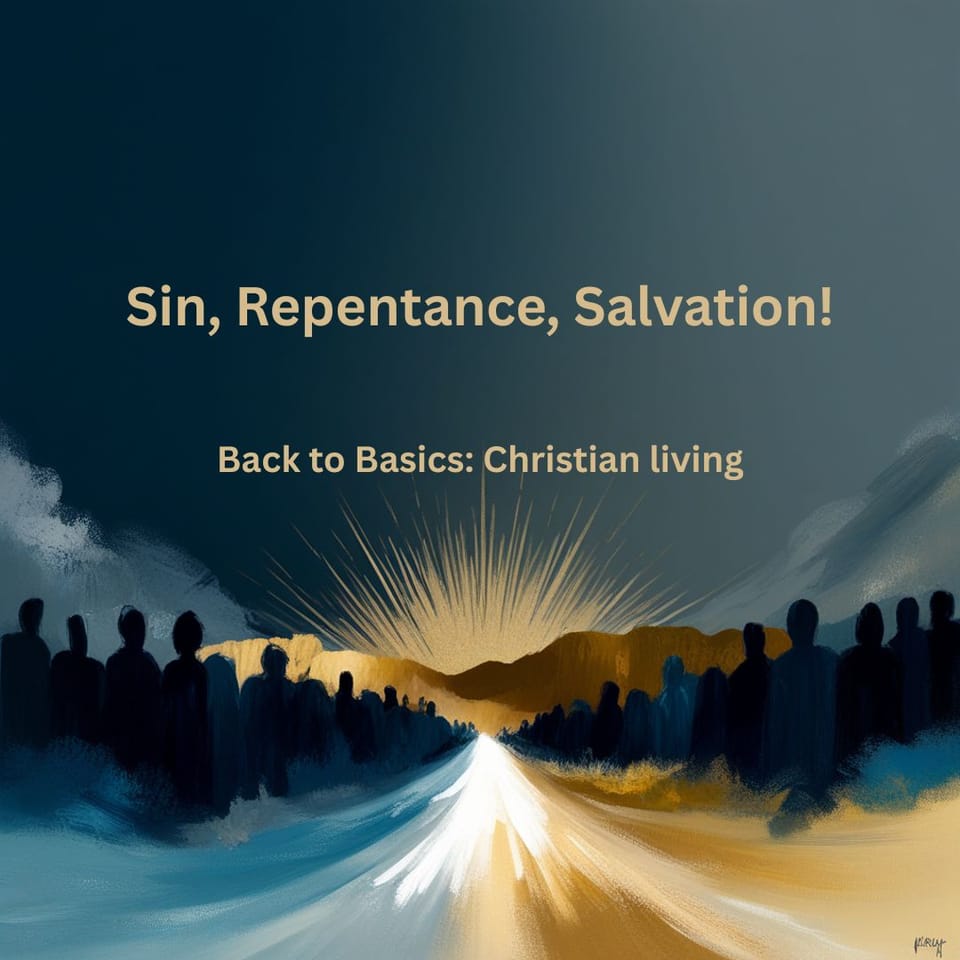Sin, Repentance, Salvation!

The Divine Invitation!
In the tapestry of Christian faith, three vital threads weave together to form the complete picture of our relationship with God: sin, repentance, and salvation. These concepts form the cornerstone of our understanding of humanity's fallen nature and God's redemptive plan. Today, we'll explore these fundamental principles that shape our Christian walk.
The Reality of Sin
Sin entered our world through one man's disobedience, forever altering humanity's relationship with our Creator. As Scripture plainly tells us: "Wherefore, as by one man sin entered into the world, and death by sin; and so death passed upon all men, for that all have sinned." (Romans 5:12 KJV)
This universal condition affects every person born into this world. We are not sinners because we sin; rather, we sin because we are born with a sinful nature. The Psalmist acknowledged this truth when he wrote: "Behold, I was shapen in iniquity; and in sin did my mother conceive me." (Psalm 51:5 KJV)
Sin manifests itself in various forms—through thoughts, words, and deeds that fall short of God's perfect standard. It can be both commission (doing what we shouldn't) and omission (not doing what we should). James reminds us: "Therefore to him that knoweth to do good, and doeth it not, to him it is sin." (James 4:17 KJV)
The wages of this sin are severe and eternal: "For the wages of sin is death; but the gift of God is eternal life through Jesus Christ our Lord." (Romans 6:23 KJV) This death represents not just physical death, but spiritual separation from God—the source of all life and goodness.
The Necessity of Repentance
God, in His mercy, doesn't leave us in our sinful state without hope. He calls us to repentance—a complete change of mind and heart regarding sin. Repentance isn't merely feeling sorry; it's a decisive turning away from sin and turning toward God.
Jesus began His earthly ministry with this call: "The time is fulfilled, and the kingdom of God is at hand: repent ye, and believe the gospel." (Mark 1:15 KJV) This urgent message remains relevant for every person in every age.
True repentance involves acknowledgement of our sin, godly sorrow, and a sincere desire to change. As Paul explains: "For godly sorrow worketh repentance to salvation not to be repented of: but the sorrow of the world worketh death." (2 Corinthians 7:10 KJV)
The prophet Joel beautifully captures the heart of repentance: "Therefore also now, saith the LORD, turn ye even to me with all your heart, and with fasting, and with weeping, and with mourning: And rend your heart, and not your garments, and turn unto the LORD your God: for he is gracious and merciful, slow to anger, and of great kindness, and repenteth him of the evil." (Joel 2:12-13 KJV)
Repentance is not a one-time event but a continuous process in the Christian's life. As we grow in our knowledge of God's holiness, we become increasingly sensitive to sin and more diligent in turning from it.
The Glory of Salvation
Salvation is God's magnificent response to humanity's sin problem. It is entirely His work, flowing from His love and grace: "For God so loved the world, that he gave his only begotten Son, that whosoever believeth in him should not perish, but have everlasting life." (John 3:16 KJV)
This salvation comes through faith in Jesus Christ, who took our sins upon Himself: "Who his own self bare our sins in his own body on the tree, that we, being dead to sins, should live unto righteousness: by whose stripes ye were healed." (1 Peter 2:24 KJV)
We cannot earn this salvation through our own efforts or good works. Scripture is clear: "For by grace are ye saved through faith; and that not of yourselves: it is the gift of God: Not of works, lest any man should boast." (Ephesians 2:8-9 KJV)
When we repent and place our faith in Christ, we experience regeneration—being born again. Jesus explained this spiritual rebirth to Nicodemus: "Jesus answered and said unto him, Verily, verily, I say unto thee, Except a man be born again, he cannot see the kingdom of God." (John 3:3 KJV)
Salvation brings immediate benefits: justification (being declared righteous), reconciliation with God, adoption into His family, and the indwelling presence of the Holy Spirit. "Therefore if any man be in Christ, he is a new creature: old things are passed away; behold, all things are become new." (2 Corinthians 5:17 KJV)
The Continuing Journey
Once saved, we begin the lifelong process of sanctification—being conformed to the image of Christ. "But we all, with open face beholding as in a glass the glory of the Lord, are changed into the same image from glory to glory, even as by the Spirit of the Lord." (2 Corinthians 3:18 KJV)
This journey involves ongoing repentance as the Holy Spirit reveals areas in our lives that need transformation. We become increasingly aware of our need for Christ's righteousness and less confident in our own abilities.
The apostle John addresses this continuing need for confession and cleansing: "If we confess our sins, he is faithful and just to forgive us our sins, and to cleanse us from all unrighteousness." (1 John 1:9 KJV)
We can rest assured that the God who began this good work in us will bring it to completion: "Being confident of this very thing, that he which hath begun a good work in you will perform it until the day of Jesus Christ." (Philippians 1:6 KJV)
The Final Redemption
Our salvation will be fully realised when Christ returns and we receive glorified bodies, free from the presence and effects of sin: "For our conversation is in heaven; from whence also we look for the Saviour, the Lord Jesus Christ: Who shall change our vile body, that it may be fashioned like unto his glorious body." (Philippians 3:20-21 KJV)
In eternity, we will dwell in the presence of God, experiencing the fulness of our salvation: "And God shall wipe away all tears from their eyes; and there shall be no more death, neither sorrow, nor crying, neither shall there be any more pain: for the former things are passed away." (Revelation 21:4 KJV)
The intertwined realities of sin, repentance, and salvation form the heart of the gospel message. We acknowledge our sin, turn from it in genuine repentance, and receive by faith the salvation Christ offers. This is not merely theological knowledge but lived experience—a transformative relationship with the living God.
As we continue our Christian journey, may we never lose sight of the seriousness of sin, the necessity of repentance, or the magnificence of God's salvation. As Peter exhorts us: "But grow in grace, and in the knowledge of our Lord and Saviour Jesus Christ. To him be glory both now and forever. Amen." (2 Peter 3:18 KJV)
Let us walk humbly with our God, ever mindful of His mercy, ever grateful for His grace, and ever committed to living lives that reflect His holiness and love…
Key Takeaways:
- Sin is a universal condition that affects all of humanity, originating from Adam's disobedience (Romans 5:12 KJV)
- Genuine repentance involves acknowledgement of sin, godly sorrow, and a sincere turning away from sin toward God
- Salvation is God's gift of grace through faith in Jesus Christ, not earned by our works (Ephesians 2:8-9 KJV)
- The Christian journey involves ongoing sanctification as we are gradually transformed into Christ's image (2 Corinthians 3:18 KJV)
- Our salvation will be fully realised when Christ returns, freeing us completely from the presence and effects of sin





